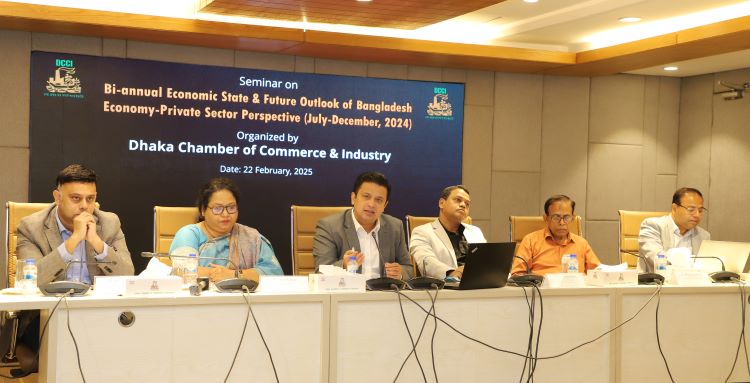News Flash

DHAKA, Feb 22, 2025 (BSS) - Dhaka Chamber of Commerce and Industry (DCCI)
president Taskeen Ahmed today put emphasis on raising the credit flow to
double digit in the private sector, bringing good governance and transparency
in the financial sector to ensure an overall business and investment-friendly
environment in the country.
He also stressed the need for reducing the interest rate on loans, continuing
policy support to expand local and foreign investment, developing integrated
development in the infrastructure sector, improving market management to
reduce inflation and reducing VAT on essential commodities and formulating a
long-term supportive energy pricing policy for the industrial sector.
The DCCI president made the remarks at a seminar on "bi-annual economic state
and future outlook of Bangladesh economy-private sector perspective July-
December, 2024" organised by the DCCI at its auditorium today.
Taskeen presented the keynote paper on the overall scenario of the economy
during the July-December period of FY25 at the seminar.
In his presentation, he highlighted the global economic situation, monetary
policy, inflation, private investment, FDI, agriculture, industry and
services sector, CMSME, energy and power, logistics infrastructure, skill
development and financial sector.
The DCCI President also suggested for curbing public expenditure through more
austerity measures as well as increasing the credit flow to double digit in
the private sector, strong vigilance to reduce non-performing loans, good
governance and transparency in the financial sector, and reducing the
interest rate on loans to restore the confidence among the entrepreneurs.
He also proposed for improving market monitoring to reduce inflation, strict
enforcement of law and order to break illegal syndicates and increasing VAT
on luxury goods in addition to reducing VAT on essential commodities.
Speaking as the chief guest, Md. Abdur Rahim Khan, secretary (Routine Charge)
of Ministry of Commerce, said it is possible to reduce the cost of trade by
10 to 15 percent if the logistics policy and trade facilitation agreement of
WTO are fully implemented.
Terming the light engineering industry as a 'game-changer' for the economy,
he said the Ministry of Commerce has taken an initiative to set up a
'Technology Centre' in Gazipur to build the capacity and support the
entrepreneurs of light engineering sector.
Later, he opined that increased revenue generation and attracting export-
oriented foreign direct investment can reduce the investment gap.
"At present there is no gap between the bureaucracy and private sector," he
said stressing on improving export competitiveness to face the challenges of
LDC graduation.
As discussant, Dr. M Masrur Reaz, chairman of Policy Exchange of Bangladesh,
said the central bank took several positive initiatives by the end of 2024
leading to a positive impact on the economy for which the inflation slightly
came down.
He said once the reserve will increased up to US$25-$27 billion within the
current fiscal, the country will be able to see the improvement in import in
the industrial sector and supply side as well.
To contain inflation and price manipulation, he opined that it is necessary
to strengthen the capacity of Bangladesh Competition Commission and other
concerned agencies of the government for a strong market monitoring.
He expressed his high hope that if uninterrupted energy supply to the
industries can be ensured and industrial unrest can be controlled, then the
export will increase by $5-7 billion more this year, which will have a
positive impact on the reserve as well.
Professor of Department of Development Studies, Dhaka University (DU) Dr.
Mohammad Abu Eusuf said the government should not go for declaring a
traditional budget with a huge deficit for the next fiscal year.
"To meet up the deficit budget, the government has to take loan from the
banking sector and that creates a negative impact on private sector credit
flow," he added.
Eusuf said that coordination of budget, monetary policy and market mechanism
is very important to control inflation.
He also stressed on increasing the tax-GDP ratio in Bangladesh as it is still
very low in the region.
Research Director of BIDS Dr. Mohammad Yunus said to meet the post-LDC
challenges, there is a need to increase compliance in the industry and
enhance public-private coordination based on extensive research.
Bangladesh Bank's Executive Director (Research) Dr. Sayera Younus said due to
supply side factors, the inflation increased but the central bank intervened
in the right time to address the problems through its monetary policy,
increasing policy rates and other mechanism.
Bangladesh Bank is closely monitoring the exchange rate and now it is quite
stable, she said, adding that the overall outlook of the economy is good and
the future is bright.
Additional Secretary of ERD AHM Jahangir said Bangladesh is fully prepared
for the graduation from the LDC status, but the final call should come from
the government upon consultation with all stakeholders.
He stressed on a comprehensive and a well-covered smooth transition strategy
(STS) plan to be prepared both by the public and private sector.
DCCI Vice-president Md. Salem Sulaiman and members of the board of directors
were present, among others, on the occasion.